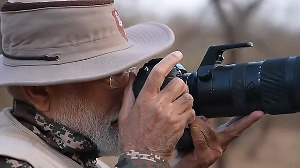Popular actor Vijaykant, who became the latest cine personality in Tamil Nadu to take a plunge into politics, appears to be charting a course different from the established Dravidian parties Dravida Munnetra Kazhagam and All India Anna Dravida Munnetra Kazhgam on the sensitive issue of the Hindi language.
At the same time, the actor is following in the footsteps of his more illustrious predecessor, legendary actor M G Ramachandran, in certain areas, including developing his political base and public espousal of faith in God, unlike several leading Dravidian politicians in the state.
Vijayakant, a darling among the youth of the state, had announced the floating of Desiya Murpokku Dravidar Kazahgam, at a massive conference of his fans at Madurai on September 14, and promised to provide an alternative to DMK and AIADMK, who have been ruling Tamil Nadu since 1967, at least on the Hindi language issue.
While AIADMK and DMK were totally against the imposition of Hindi and discouraged learning of Hindi in the state, Vijayakant is not averse to any language, including Hindi, being taught in schools.
His philosophy is that Tamil, as the mother tongue of the Tamils, should be given prime place but at the same time, learning of English, which he considers as the window to the world outside, and other Indian languages to enable Tamilians to get job outside Tamil Nadu could be taught in schools.
"Tamils should not be deprived of the chances getting jobs outside the state only because they are not well versed in other Indian languages," the actor said.
Vijaykant's approach on all issues is almost similar to that late MGR, who had stood apart in the more or less stereotyped galaxy of Dravidian party leaders. Unlike other leaders, MGR had openly admitted he was a pious man and had faith in God.
Vijayakant also admits he is religious-minded and has no hesitation in visiting temples to offer prayers. In fact, he recently visited the hill temple at Tirumala and placed his party flag at the feet of the presiding deity there.
MGR, who was with DMK for long, had set up his fans' clubs as a frontal organisation to the party and his fans had totally involved themselves in electioneering in 1967, when the party unseated Congress from power in the state. When he was dismissed from DMK in 1972, he made the fans clubs his party apparatus.
Vijayakant, too, is banking on his fans clubs to build up his fledgling party. But Vijayakant's fans belong to many political parties and it remains to be seeen whether they give up their party affiliations to join his party. The actor has given prominent positions in the party to office-bearers of his fans' club.
Though several leaders, who felt sidelined and frustrated in many political parties had approached him to join the party, Vijayakant, who had given prominent position in the party to office bearers of his fans club, had asked them to wait until his party got registered with the Election Commission of India.
Whether Vijayakant, who had proved his mettle as a leader by heading the South Indian Artistes Association for over 10 years, and solving many problems of film actors and actresses, could do so in politics, is the point being discussed in political circles in Chennai.
Many film personalities had burnt their fingers in politics in Tamil Nadu. Bagyaraj, who was once described by late MGR as his heir in film world, could not succeed when he formed his own outfit.
Vijay Rajendhaar, a popular actor-director in Tamil films also tried his luck in electoral politics on his own but failed. Only when he contested on a DMK ticket, he was able to win an assembly seat.
Thespian Sivaji Ganesan, who had a long association with Congress, parted company with the party in 1988 to float his own party -Tamizhaga Munnetra Munnani - but he could not make a mark in state politics, though he also had sizable fans in the state.
Tamil Nadu has seen several film personalities head the state. The late C N Annadurai, who was a film script writer and popularised the policies of the DMK that he founded in 1948, became the first non-Congress chief minister of the state. His successor and present DMK president, M Karunanidhi, had written scripts for over 75 films and continues to do so even now. He has also penned lyrics for films.
MGR, who had succeeded Karunanidhi as chief minister, was a darling among the masses and had acted in over 150 films, most of them runaway successes. His widow, Janaki Ramachandran, who was the chief minister for a short while, was also an actress. In fact, she was the first woman to become the chief minister of the state.
Present Chief Minister J Jayalalithaa has acted in more than 100 films and was a popular heroine. S S Rajendran was the first actor to become a member of the state assembly. When DMK contested the polls for the first time in 1957, he was elected to the state assembly on a DMK ticket from Theni in south Tamil Nadu.
The present assembly has two actors as members - Napoleon of DMK and Radha Ravi of the AIADMK. S S Chandran, a popular comedian has been elected to the Rajya Sabha on behalf of AIADMK, while Sarathkumar, a popular hero, was elected to the upper house of Parliament on a DMK ticket.






 © 2025
© 2025